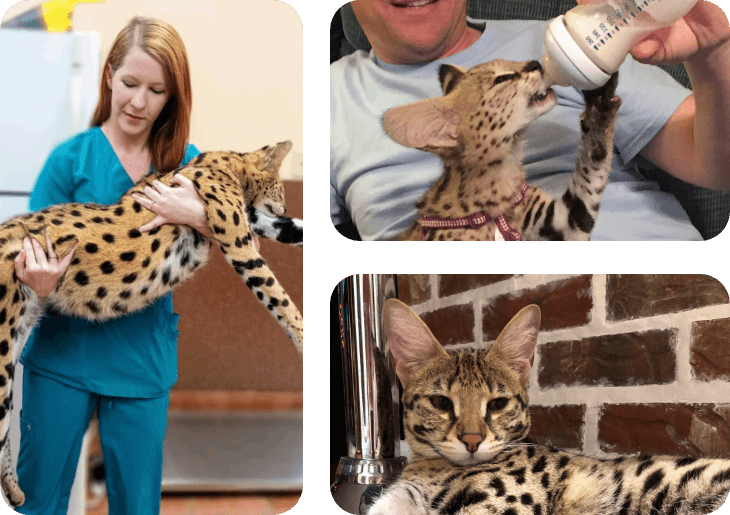
Taking home your very own Savannah kitten is exciting. But there are some things you should know before you can welcome one of my Savannah kittens into your home.
While the basics of caring for your Savannah kitten are like that of any other cat, these unique animals require a lot from their owners. I spend a lot of time working with potential owners to determine whether their family and home are a good fit.
Here are a few things I recommend my clients do to give their kitten a wonderful life.
1. PARTNER WITH A VET WHO UNDERSTANDS SAVANNAH CATS.
Savannah kittens do not have any known genetic health issues and should enjoy a long and healthy life. Your fur baby could live up to 20 years, so it’s important to develop a relationship with a vet you trust.
When choosing a veterinarian, consider asking if the vet has experience with Savannah kittens. If your kitten gets sick – or even for routine immunizations, dental health screenings, and annual checkups – a vet who has worked with Savannah kittens can anticipate their needs and help put you and your kitten at ease.
2. MAKE SOCIALIZATION AND TRAINING A PRIORITY.
Early socialization has an oversized impact on your kitten’s personality. The closer they are to their serval heritage, the more important it is for you to continue socializing your cat as a kitten. Without early exposure to many people, animals, and experiences, your kitten may become anxious and frightened around people. There’s no such thing as too much socialization. Here are a few ways you can socialize your kitten:
- Consider taking your kitten to new environments after it bonds with your family.
- Make each experience as pleasant and enjoyable as possible; e.g., give them small treats when meeting new people.
- Introduce your kitten only to well-socialized animals.
Training is as important as socialization – and Savannah kittens are easily trained. Decide on the rules you want your kitten to follow before they join the household and make sure you maintain them consistently. You should also know that Savannah cats:
- Respond well to positive training, a dominance hierarchy (you’re the boss), and clear boundaries.
- Feel anxious when punished or faced with inconsistent rules.
- Will create their own adventures if their mind isn’t occupied. Teaching them new words and commands will help keep them from getting into mischief.

3. PREPARE YOUR HOME FOR YOUR SAVANNAH CAT.
As with any new pet, it’s important to create an environment where your Savannah kitten will thrive. While there are many things you can do to get your home ready to welcome your newest family member, here are three of the most important things to remember:
- Cats tend to view birds, fish, and rodents as prey. Keep these creatures in separate enclosures. Even if your kitten seems to play with these animals, never leave them alone together.
- Create a safe hiding space in your house for your kitten. Savannah kittens need quiet time in a place undisturbed by visitors, other pets, and loud noises. Your kitten may choose its own safe space, or you can prepare one. Just make sure they always have access to their preferred safe space.
- Create cat-friendly play areas in each room, as well as cat-proof spaces. Cat toys, scratching posts, and tall cat trees can do wonders in diverting your Savannah kitten from destructive behaviors like clawing the curtains. And cat-proofing a few rooms will give your Savannah a safe space to be when you’re not around.
